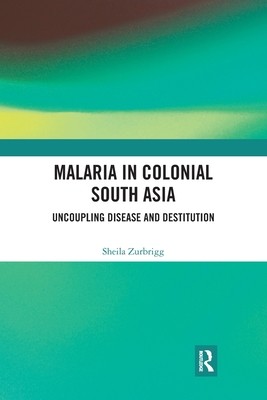
- We will send in 10–14 business days.
- Author: Sheila Zurbrigg
- Publisher: Routledge Chapman & Hall
- ISBN-10: 036777769X
- ISBN-13: 9780367777692
- Format: 15.6 x 23.4 x 1.7 cm, softcover
- Language: English
- SAVE -10% with code: EXTRA
Reviews
Description
This book highlights the role of acute hunger in malaria lethality in colonial South Asia and investigates how this understanding came to be lost in modern medical, epidemic, and historiographic thought.
Using the case studies of colonial Punjab, Sri Lanka, and Bengal, it traces the loss of fundamental concepts and language of hunger in the inter-war period with the reductive application of the new specialisms of nutritional science and immunology, and a parallel loss of the distinction between infection (transmission) and morbid disease. The study locates the final demise of the 'Human Factor' (hunger) in malaria history within pre- and early post-WW2 international health institutions - the International Health Division of the Rockefeller Foundation and the nascent WHO's Expert Committee on Malaria. It examines the implications of this epistemic shift for interpreting South Asian health history, and reclaims a broader understanding of common endemic infection (endemiology) as a prime driver, in the context of subsistence precarity, of epidemic mortality history and demographic change.
This book will be useful to scholars and researchers of public health, social medicine and social epidemiology, imperial history, epidemic and demographic history, history of medicine, medical sociology, and sociology.
EXTRA 10 % discount with code: EXTRA
The promotion ends in 17d.10:45:53
The discount code is valid when purchasing from 10 €. Discounts do not stack.
- Author: Sheila Zurbrigg
- Publisher: Routledge Chapman & Hall
- ISBN-10: 036777769X
- ISBN-13: 9780367777692
- Format: 15.6 x 23.4 x 1.7 cm, softcover
- Language: English English
This book highlights the role of acute hunger in malaria lethality in colonial South Asia and investigates how this understanding came to be lost in modern medical, epidemic, and historiographic thought.
Using the case studies of colonial Punjab, Sri Lanka, and Bengal, it traces the loss of fundamental concepts and language of hunger in the inter-war period with the reductive application of the new specialisms of nutritional science and immunology, and a parallel loss of the distinction between infection (transmission) and morbid disease. The study locates the final demise of the 'Human Factor' (hunger) in malaria history within pre- and early post-WW2 international health institutions - the International Health Division of the Rockefeller Foundation and the nascent WHO's Expert Committee on Malaria. It examines the implications of this epistemic shift for interpreting South Asian health history, and reclaims a broader understanding of common endemic infection (endemiology) as a prime driver, in the context of subsistence precarity, of epidemic mortality history and demographic change.
This book will be useful to scholars and researchers of public health, social medicine and social epidemiology, imperial history, epidemic and demographic history, history of medicine, medical sociology, and sociology.


Reviews